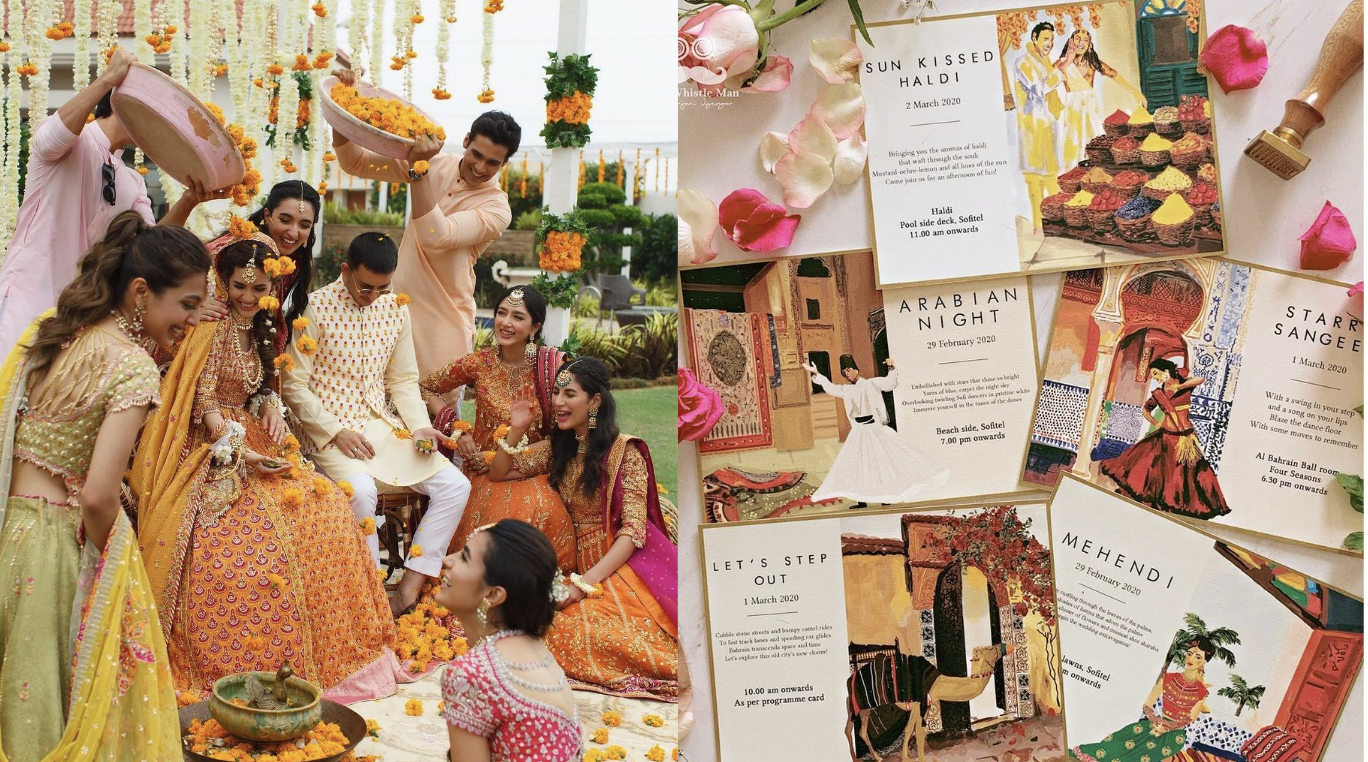When To Send Wedding Invitations: A Complete Timeline
Invitations & Stationery SachiPerfect timing plays a pivotal role in the success and attendance of your wedding day, and it all begins with the sending of those coveted wedding invitations. In this article, we aim to offer expert guidance on the art of timing your wedding invitation dispatch with precision, aligning it seamlessly with both etiquette and practicality.
The significance of sending out your wedding invitations at the optimal moment cannot be overstated. Firstly, it grants your cherished guests the gift of time – time to RSVP, prepare for your special day, and make the necessary arrangements. Secondly, it offers you, the couple, the opportunity to fine-tune essential details such as guest lists, seating arrangements, and catering logistics. Most importantly, it reflects thoughtfulness and consideration towards your guests, allowing them to reserve your wedding date and prioritize it in their schedules.
We will also delve into the multitude of factors that influence the perfect timing for sending out wedding invitations. We will consider the nature of your wedding – whether it's a local celebration or a destination extravaganza – as well as the season in which your vows will be exchanged.
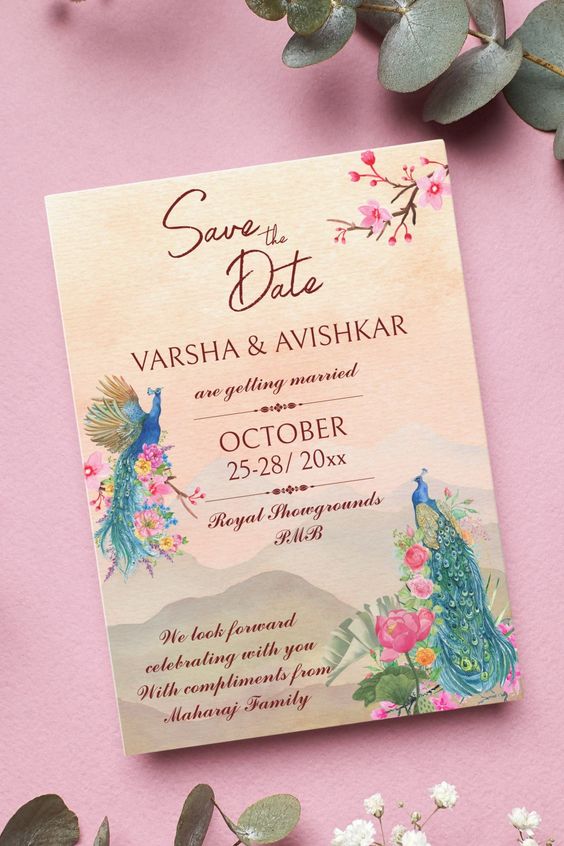
Source: Zazzle
Furthermore, we will provide invaluable counsel on when to embark on the design and ordering of your invitations, leaving room for any unforeseen delays. We will also address the concept of Save the Dates, a prelude to the official invitation, serving as an early heads-up for your guests.
By the time you conclude this article, you will possess a comprehensive understanding of the ideal timing for sending wedding invitations, tailored to your unique circumstances. With this knowledge, you will navigate the wedding planning journey with confidence, ensuring that your invitations reach your guests at precisely the right moment, and contributing to a seamlessly executed and unforgettable celebration.
The Traditional Timeline
1. Save-the-Date Cards
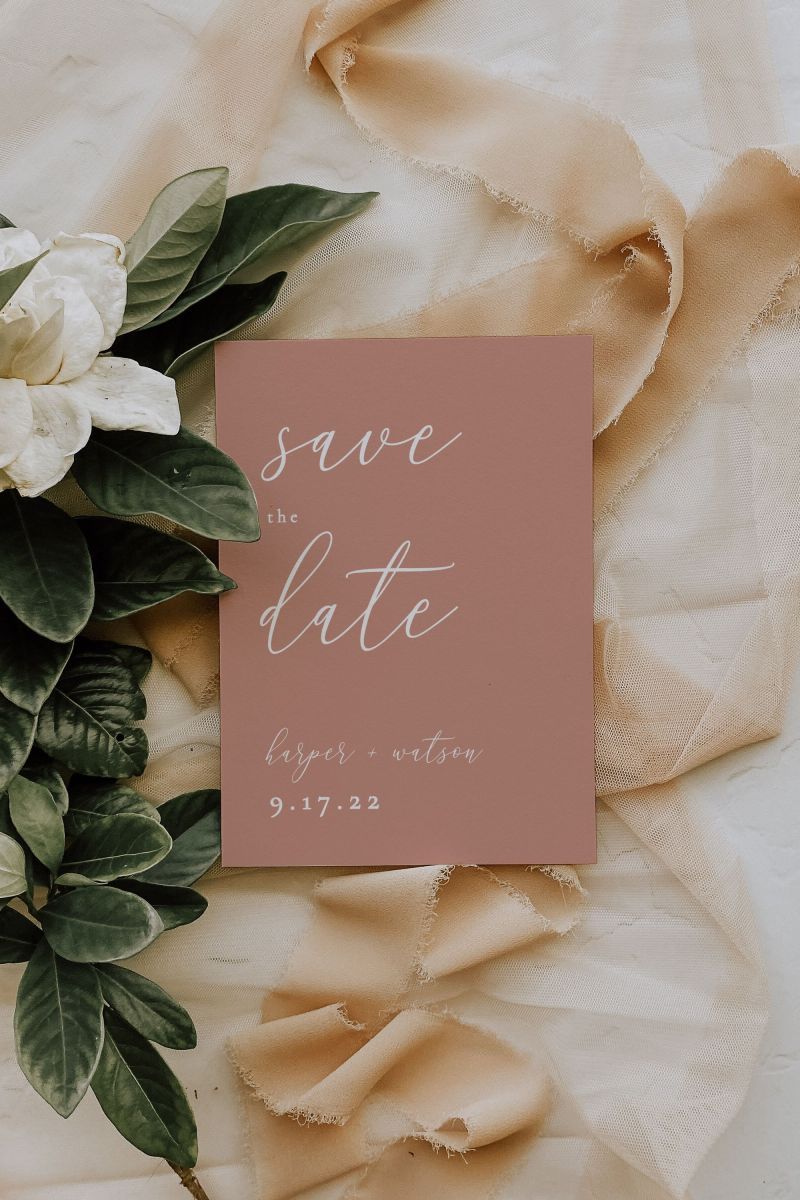
Source: Etsy
Save-the-date cards are a prelude to wedding invitations, providing advance notice to guests about an upcoming wedding. They serve two primary purposes: informing potential attendees of the wedding date and location while also ensuring their availability.
When to Send Save-the-Date Cards
Save-the-date cards are typically sent out well in advance of the formal wedding invitations, usually 6 to 12 months ahead of the wedding date. This early notice is particularly important for destination weddings or weddings during peak seasons when guests may need to make travel arrangements or clear their schedules.
Why Save-the-Date Cards Are Important
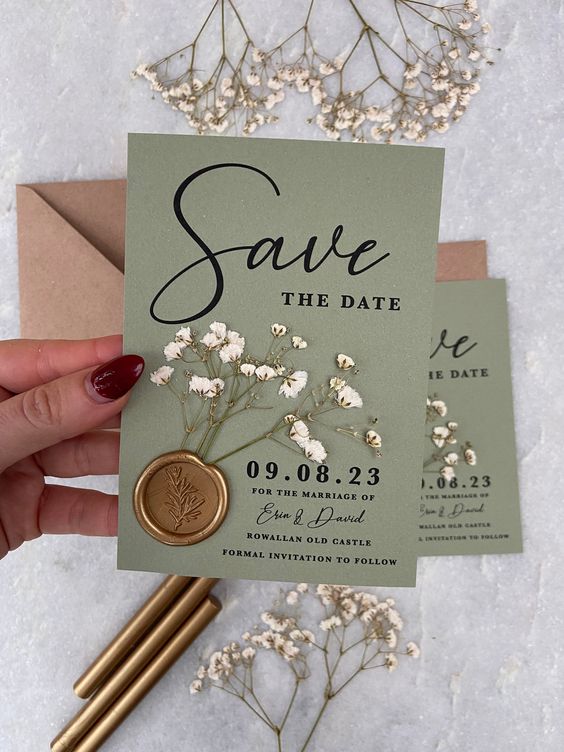
Source: Etsy
1. Availability: Guests often have busy schedules with work, family, and other commitments. Sending save-the-date cards allows them to mark the wedding date on their calendars, increasing the likelihood that they'll be able to attend.
2. Travel Planning: For destination weddings or weddings in unfamiliar locations, guests may need time to make travel arrangements, book accommodations, and secure time off from work.
3. Avoid Scheduling Conflicts: Advance notice helps guests avoid scheduling conflicts with other events or obligations, reducing the chance of last-minute cancellations.
4. Emotional Connection: Save-the-date cards build excitement and anticipation among guests, creating an emotional connection to the wedding even before formal invitations are sent.
5. Guest Count: These cards also help couples estimate the number of attendees, aiding in venue selection, seating arrangements, and catering decisions.
2. Formal Invitations

Source: Atelier Azure
Sending formal wedding invitations at the right time is essential to ensure guests have sufficient notice and can make necessary arrangements. Here's a general timeline for when to send formal wedding invitations and what to include:
When to Send:
Local Wedding: For a local wedding, sending invitations 6-8 weeks in advance is customary. This allows guests enough time to RSVP and make plans without forgetting about the event.
Destination Wedding: If you're having a destination wedding, consider sending invitations 3-4 months ahead to accommodate travel arrangements.
What to Include:
1. Invitation: The invitation itself should include the names of the hosts (usually the couple or their families), the request for the guest's presence, the date and time of the wedding, the venue address, and any dress code information.
2. RSVP Card: Include a separate RSVP card with a stamped, self-addressed envelope to make it easy for guests to respond. This card should have a space for guests to indicate whether they'll attend and often includes meal choices.
3. Details Card: If necessary, include a details card with additional information, such as directions to the venue, accommodations, parking instructions, and any specific wedding-related events.
4. Registry Information: It's typically considered polite to include registry information on your wedding website rather than directly in the invitation. Include the website URL on a separate card, if desired.
5. Envelope: Use formal addressing on the envelope, including the guest's full name and proper titles. Be sure to include a return address on the outer envelope.
6. Stamps: Pre-stamp the RSVP envelopes to make it convenient for guests to respond promptly.
Also Read: Wedding Invitation Etiquette: Everything You Need to Know
Factors That Can Affect the Timeline
Sending out wedding invitations at the right time is essential for a smooth planning process and ensuring a successful turnout on your special day. Several factors can influence the timeline for sending out wedding invitations, and understanding these considerations will help you plan your invitations effectively.
1. Destination Weddings
Special considerations: If you're having a destination wedding, it's crucial to send out invitations well in advance. Guests will need extra time to make travel arrangements, take time off work, and potentially secure passports or visas if it's an international location. Aim to send invitations at least 3-4 months before the wedding to give everyone ample time to plan and RSVP.
2. Holiday Seasons
How holidays can affect your timeline: Be mindful of holiday seasons when planning your wedding invitations. Major holidays, like Christmas or New Year's, can be hectic for your guests, who may have other commitments or travel plans. Additionally, postal services might experience delays during these times. To avoid potential scheduling conflicts and postal hiccups, consider sending out invitations slightly earlier, perhaps 8-10 weeks before the wedding.
3. Custom Invitations
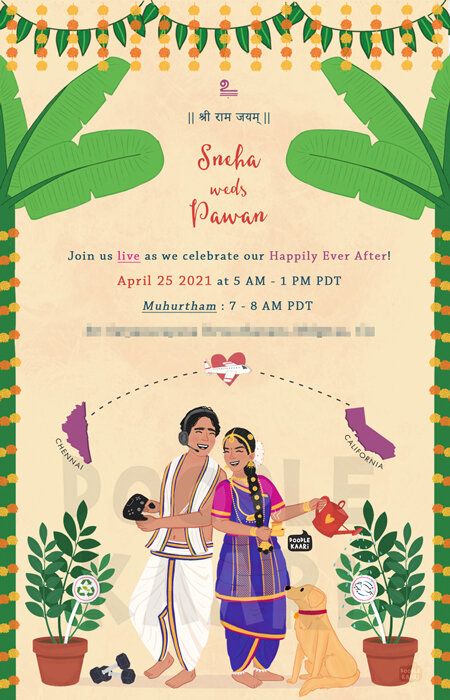
Source: Doodle Kaari
Time needed for design and printing: If you're opting for custom-designed wedding invitations, the design and printing process can take longer than using pre-made templates. Start the design process early, ideally 4-6 months before the wedding. This allows time for revisions, proofing, and any unforeseen delays. Once your design is finalized, it's advisable to order your custom invitations at least 2-3 months before your wedding date. This ensures you have them ready to send out as per your chosen timeline.
Remember that these timelines are general guidelines, and your specific circumstances may require adjustments. Always communicate with your guests' needs and convenience in mind. If you're uncertain about the ideal timeline for your wedding invitations, consulting with a wedding planner or stationery professional can provide valuable insights and help ensure your invitations are sent out at the most suitable time for your unique wedding. Ultimately, thoughtful timing will contribute to a smoother and more enjoyable wedding planning process for both you and your guests.
Modern Trends
1. Digital Invitations: Pros and Cons and Timing Considerations
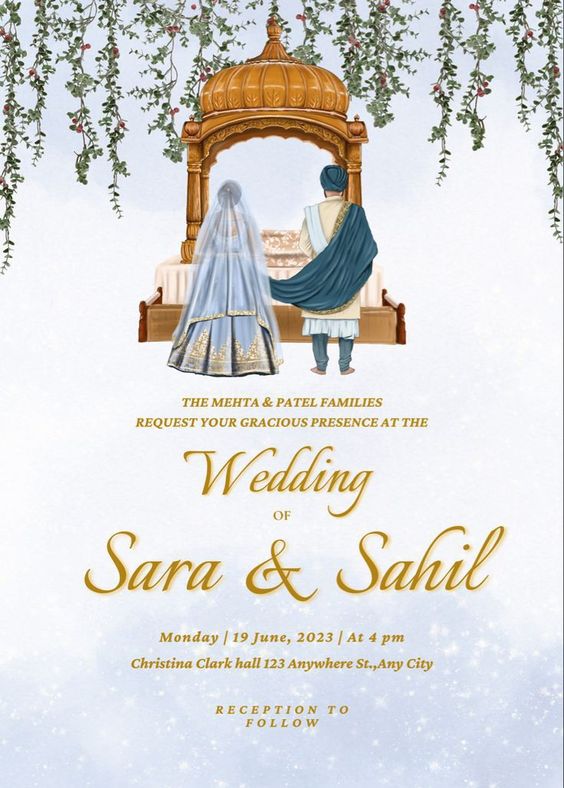
Source: Pinterest
Digital invitations have gained popularity in recent years, offering a modern alternative to traditional paper invitations. However, they come with their own set of advantages and disadvantages, along with specific timing considerations.
Pros:
Cost-Effective: Digital invitations are often more budget-friendly than traditional paper invitations. They eliminate expenses related to printing, postage, and physical materials.
Eco-Friendly: Going digital reduces paper waste, making it a greener choice for environmentally-conscious couples.
Convenience: Sending digital invitations is quick and convenient. You can reach guests instantly via email or social media, allowing for faster RSVPs and communication.
Interactive Elements: Digital invitations can incorporate interactive features like RSVP buttons, event maps, and links to wedding websites for additional information.
Cons:
Less Formal: Some may consider digital invitations less formal than their paper counterparts, which may not suit all wedding styles.
Email Delivery Issues: Emails can get lost in spam folders or overlooked, leading to missed invitations and RSVPs.
Limited Aesthetic Customization: While digital invitations offer design options, they may have limitations compared to the artistic possibilities of custom paper invitations.
Timing Considerations:
Send Early: Send digital invitations earlier than paper ones, especially for destination weddings or events that require extensive travel plans. Aim for 4-6 months in advance to allow guests time to prepare.
Follow-up Promptly: Keep track of RSVPs and send reminders if needed. Digital invitations can lead to quicker responses, but they may also require follow-up messages.
Check for Read Receipts: If using email, monitor read receipts to ensure your invitations are seen, and guests have received them.
2. Last-Minute Weddings
Last-minute weddings can present unique challenges when it comes to handling invitations. Whether you've had a sudden change in plans or decided on an impromptu celebration, here's how to navigate the invitation process:
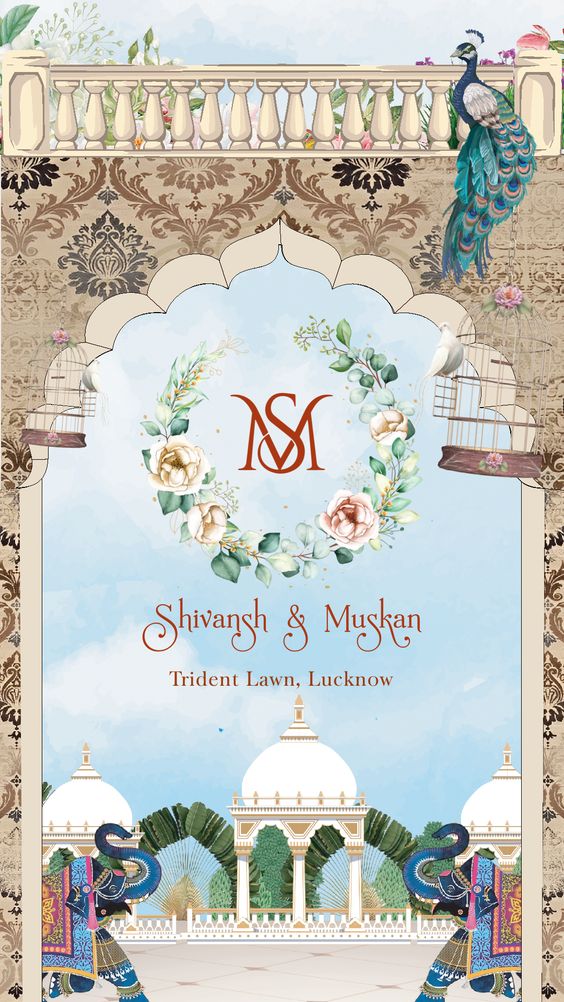
Source: Pinterest
1. Digital Invitations: In a time crunch, consider digital invitations. Create e-invites or use online invitation services. This allows for quick distribution via email or social media, saving valuable time compared to traditional printed invitations.
2. Phone Calls or Messages: For very last-minute weddings, a personal touch can be appreciated. Make direct phone calls or send personalized messages to your closest friends and family, explaining the situation and inviting them personally.
3. Prioritize Must-Have Guests: Start by making a list of the absolute must-have guests. These are the people without whom your celebration would feel incomplete. Contact them first and ensure they can attend before expanding your guest list.
4. Minimalist Approach: Simplify your wedding to accommodate the short notice. Opt for a smaller, more intimate gathering with only essential elements to minimize planning stress.
5. Informal Language: When sending last-minute invitations, be upfront about the short notice and use informal language to convey the urgency. People are more understanding when they know the circumstances.
6. Follow Up Quickly: After sending invitations or making calls, follow up promptly to confirm attendance. This helps you finalize details like seating and catering without delay.
7. Consider Post-Wedding Celebrations: If some guests can't attend due to the last-minute nature, consider planning post-wedding celebrations or gatherings to include those who couldn't make it.
Common Mistakes to Avoid
Sending out wedding invitations involves delicate timing to ensure a smooth and well-attended event. Here are some common mistakes to avoid in this process:
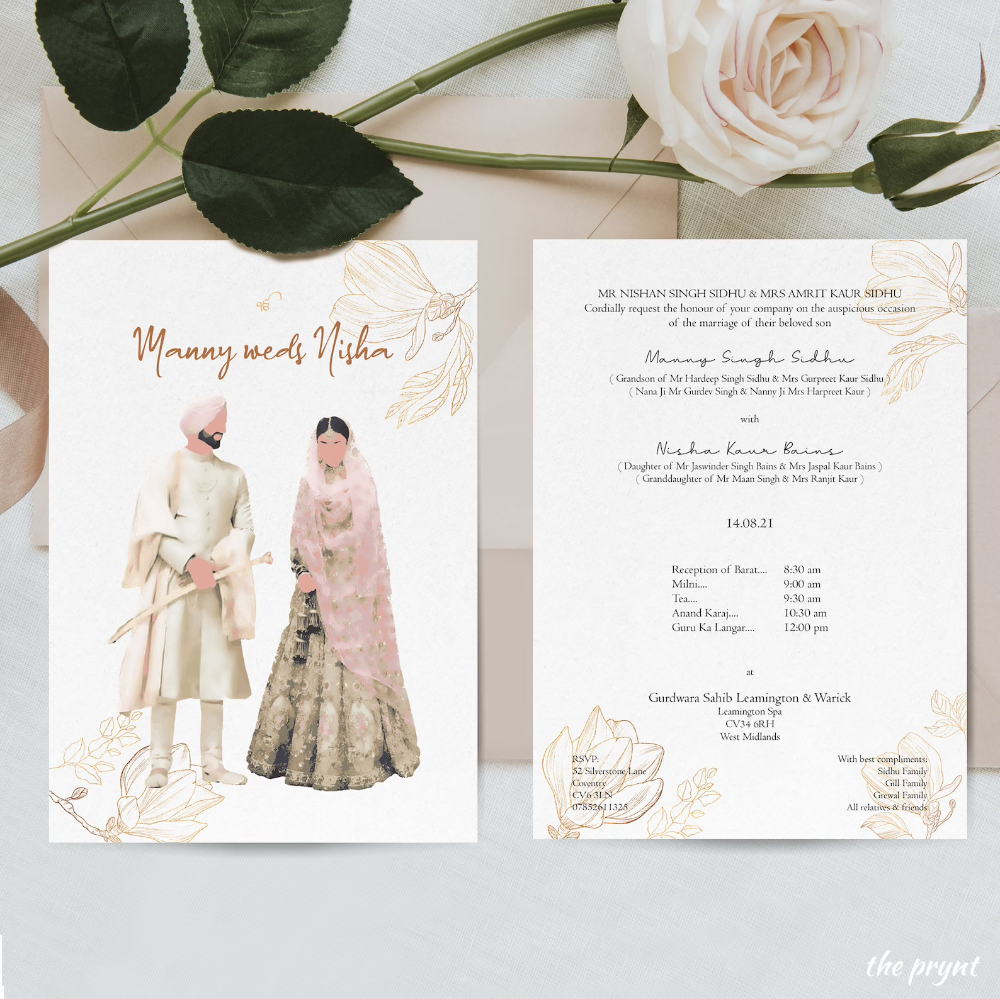
Source: The Prynt
Also Read: 20 Best Wedding Invitation Card Designs To Save For Your Wedding Day
1. Sending Too Early
Potential downsides: Sending wedding invitations excessively early, such as more than six months in advance, can have drawbacks. Guests may forget about the event, and their RSVPs may not be accurate closer to the wedding date. Moreover, early invitations can lead to uncertainties regarding attendance, affecting your planning and budgeting decisions.
2. Sending Too Late
Risks involved: On the flip side, sending wedding invitations too late can be equally problematic. Guests may have prior commitments or make other plans, making it challenging for them to attend. This could lead to disappointing attendance numbers and logistical difficulties in seating arrangements, catering, and other critical aspects of your wedding day.
3. Forgetting to Account for RSVP Time
Why it's crucial: One of the most common mistakes is failing to account for the time guests need to respond. Your wedding venue and caterer typically require a final guest count well before the event, usually several weeks in advance. If you don't factor in RSVP time, you might receive responses after your deadline or not at all, complicating your planning efforts.
To avoid these pitfalls, aim to send out your wedding invitations around 6-8 weeks before your wedding date. This timeline strikes a balance between giving guests enough notice to plan their attendance while ensuring that their RSVPs are timely enough to help you make informed decisions for your big day.
Additionally, provide clear RSVP instructions with a specific deadline, allowing you to finalize your guest list and make necessary arrangements. By avoiding the mistakes of sending invitations too early, too late, or neglecting RSVP time, you'll enhance your wedding planning experience and increase the likelihood of a well-attended and smoothly executed celebration.
Tips for Staying Organized
Staying organized throughout the wedding planning process is essential to ensure a smooth and stress-free journey to your big day. Here are some valuable tips for maintaining organization:

Source: Etsy
1. Use a Wedding Planning App or Calendar
Recommended apps and tools: Utilize wedding planning apps and online calendars to keep track of tasks, deadlines, and important dates. Some popular apps offer features like checklists, budget trackers, and guest lists. These tools can help you stay on top of everything from vendor meetings to dress fittings.
2. Set Reminders
How reminders can help: Use reminders on your phone or email to stay organized. Set alerts for important dates like vendor meetings, payment deadlines, and RSVP cutoffs. Reminders help you stay proactive and ensure that you don't miss any crucial tasks or appointments during the wedding planning process.
3. Consult with Your Wedding Planner
Expert advice: If you've hired a wedding planner, make the most of their expertise. They can offer valuable insights, help you create a detailed timeline, and keep you on track. Regular communication with your planner ensures that you're aligned on all aspects of the wedding and that your planning stays organized.
4. Create a Comprehensive Checklist
Detailed planning: Develop a comprehensive checklist that outlines every task, no matter how small. Include deadlines and prioritize items based on their importance and timing. A detailed checklist helps you visualize your progress and ensures that nothing falls through the cracks.
5. Centralize Information
One-stop resource: Maintain a centralized location for all wedding-related documents, contracts, and contact information. A digital folder or physical binder can help you quickly access essential details, streamlining communication with vendors and reducing the chances of misplacing important documents.
6. Delegate Tasks
Team effort: Share responsibilities with your partner, bridal party, or trusted family members. Delegate tasks according to everyone's strengths and interests, allowing you to focus on your areas of expertise and maintain a balanced workload.
7. Regularly Review and Update
Continuously review your plans and update them as necessary. Circumstances can change, and being adaptable ensures that your wedding remains well-organized, regardless of unexpected developments.
By incorporating these organizational strategies into your wedding planning process, you'll reduce stress, stay on top of tasks, and enjoy a more enjoyable journey toward your wedding day. Effective organization allows you to focus on creating beautiful memories while minimizing potential hiccups along the way.
Also Read: 20 Latest and Trending Eco-Friendly Wedding Invitations ideas
Conclusion
The timing of sending wedding invitations is a pivotal element in the wedding planning process. Avoiding common mistakes, such as sending invitations too early or too late, and accounting for RSVP time, is crucial for ensuring a successful and well-attended celebration. Striking the right balance allows guests ample notice while enabling couples to make informed decisions for their big day. By adhering to a well-planned invitation timeline, couples can look forward to a smoother planning experience and the joy of sharing their special moment with loved ones, making their wedding day truly unforgettable.
Edited & Photo Sourced By: Neha Garg Ahuja








